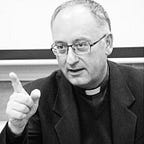Pope Francis’ rebellion to the rhetoric of the apocalypse
On November 9, 1989 the Berlin wall began to fall. It was the sunset of totalitarianism. A new epoch seemed to arise, marked by globalization. Yet today it has the traits of indifference and conflict. In the face of a collapsed wall, many others have sprung up in the world. The global crises takes various forms and is expressed in conflicts, tariffs, razor wire, migratory crises, regimes that fall, moves threatening alliances and commercial ways that open the path to wealth, but also to tensions.
When Francis spoke of the Church as a
«field hospital after a battle»
he did not intend to use a beautiful, rhetorically effective image. What he had before his eyes was a worldly scenario of
«third world war in pieces».
For Francis, the task of the Church is not that of adapting itself to the dynamic of the world, politics, or society by shoring it up and making it survive the least worst. This is judged by him as «worldliness». Much less does he intend to take sides against the world, against politics, and against society. The Pope does not reject reality in view of a longed for apocalypse, of an end that overcomes the sickness of the world by destroying it. He does not push to bring on the crisis of the world to the extreme by preaching the imminent end, nor does he hold on to the pieces of the world that is collapsing seeking systems of comfortable alliances or balancing acts. Besides, he does not seek to eliminate evil, because he knows that is impossible. It would simply move and manifest itself elsewhere, in other forms. He seeks instead to neutralize it. Precisely here is the crux for understanding what the meaning of Bergoglian action is. Here is the disturbing thought.
It is then for this reason that, under the diplomatic profile, Francis takes responsibility of the risky positions. The traditional diplomatic caution is married to the exercise of parresia, consisting of clarity and sometimes denunciation. He takes stances against speculative financial capitalism and makes constant references to the tragedy of migrants,
«a true global political knot»
the memory of the Armenian «genocide», the condemnation of the possession of (and not just the use of) nuclear arms. The persistent echoes that these stances and references have generated are those that come from a «voice crying in the wilderness», to cite Isaiah, the biblical prophet. And the Pope of mercy does not hesitate to cry «damned», during a Mass at Santa Marta to those who foment wars and make money on them.
Francis is confronted with the new global role of Catholicism in today’s context.
And in this context his is and he wants it to be essentially a spiritual and evangelical vision of international relationships. Francis presents the Church as the sign of contradiction in world accustomed to indifference. In the face of the crisis of global leadership in the western world, Francis resists the temptation of intending Catholicism as a political guarantee, «last empire», inheritor of glorious ruins, bulwark to decline. Bergoglio intends freeing pastors from feeling at war in defense of an order whose fall would lead to the apocalypse of Catholicism and perhaps of the world.
If anything, he is unfolding a systematic counter-narrative with respect to the narrative of fear.
We must, then, fight against this season of anxiety and insecurity. This is why, courageously, the Pope does not give any theological-political legitimation to terrorists, avoiding, for example, any reduction of Islam to Islamic terrorism. And he does not even give it to those who postulate and who want a «holy war» or who build barriers of razor wire precisely with the excuse to curb the apocalypse and to impose a physical and symbolic barrier with the intention of restoring an «order». The only razor wire for the Christian, in fact, is that of the crown of thorns that Christ has on his head.
The pope reacts by carrying out a pedagogical action towards those children of God who still do not know they are children and therefore brothers and sisters among themselves. His «authority» is expressed as «paternity». St Francis of Assisi ascends the throne of St Peter. A clear example of this action was the signing, together with the Grand Imam of al-Azhar, of a «Document on Human Fraternity for World Peace and Living Together». The Document courageously confronts the challenge of the disease of religion that transforms holiness into a service of political action understood as a sacred cause.
Francis encounters the Sultan, like 800 years ago.
And he launches a challenge to the apocalypse: «fraternity».
And if we are all brothers and sisters, the pope and the imam write, then we are all citizens with equal rights and duties. Every idea of «minority», that brings with it the seeds of tribalism and hostility, that sees in the face of the other the mask of enemy, disappears. Thus the message assumes global relevance: in a time marked by walls, hate and induced fear, these words turn upside down the worldly logic of inevitable conflict.
The Pope expressed it clearly in his Message for the World Day of Peace 2020: we must break the «morbid logic» of fear, «source of conflict» that increases the «risk of violence».
